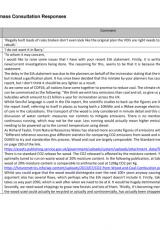Copy of Barry Biomass consultation responses.
Documents

Doc 1 , file type: PDF, file size: 769 KB
Details
24 January 2022
Dear
ATISN 15969 Barry Biomass Consultation Responses
Thank you for your request which I received on 17 January 2022. You asked for:
All the responses submitted in reply to the consultation administered by Wardell Armstrong on behalf of the Welsh Government which closed on 17 January 2022 in respect of the voluntary environmental statement prepared by Biomass UK No.2 Ltd relating to the biomass plant at Barry Docks.
Our response
A copy of the information I have decided to release is enclosed.
I have decided that the name, full address and contact details of respondents to the consultation is exempt from disclosure under regulation 13 of the Environmental Information Regulations and is therefore withheld. The reasons for applying this exception is set out in full at Annex A to this letter.
Next steps
If you are dissatisfied with the Welsh Government’s handling of your request, you can ask for an internal review within 40 working days of the date of this response. Requests for an internal review should be addressed to the Welsh Government’s Freedom of Information Officer at:
Information Rights Unit,
Welsh Government,
Cathays Park,
Cardiff,
CF10 3NQ
or Email: Freedom.ofinformation@gov.wales
Please remember to quote the ATISN reference number above.
You also have the right to complain to the Information Commissioner. The Information Commissioner can be contacted at:
Information Commissioner’s Office,
Wycliffe House,
Water Lane,
Wilmslow,
Cheshire,
SK9 5AF.
However, please note that the Commissioner will not normally investigate a complaint until it has been through our own internal review process.
Yours sincerely
Annex A
Regulation 13– Personal data
Regulation 13 of the EIRs sets out an exemption from the right to know if the information requested is personal information protected by the Data Protection Act 1998 (DPA). Personal data is defined in Section 1(1) of the DPA as:
“personal data” means data which relates to a living individual who can be identified from those data; or from those data and other information which is in the possession of, or is likely to come into the possession of, the data controller.
We have concluded that, in this instance, the information requested contains third party personal data. Under Regulation 13(1) of the EIRs, personal data is exempt from release if disclosure would breach one of the data protection principles. We consider the principle being most relevant in this instance as being the first.
The first data protection principle states:
Personal data shall be processed fairly and lawfully and, in particular, shall not be processed unless—
(a) at least one of the conditions in Schedule 2 is met, and (b) in the case of sensitive personal data, at least one of the conditions in Schedule 3 is also met.
We consider that the identity of a member of the public and their home address, personal e-mail address and wet signature clearly falls within the description of personal data as defined by the DPA and that its disclosure would breach the first data protection principle. The first data protection principle has two components:
1. Personal data shall be processed fairly and lawfully and
2. Personal data shall not be processed unless at least one of the conditions in DPA schedule 2 is met.
Guidance from the Information Commissioner’s Office (Personal information (section 40 and regulation 13) v 1.3) states (at p11):
- The starting point is to consider whether it would be fair to the data subject to disclose their personal data. The key considerations in assessing this are set out in the section on Fairness below.
- If disclosure would not be fair, then the information is exempt from disclosure.
This approach was endorsed by the Court of Appeal in the case of Deborah Clark v the Information Commissioner and East Hertfordshire District Council where it was held:
“The first data protection principle entails a consideration of whether it would be fair to disclose the personal data in all the circumstances. The Commissioner determined that it would not be fair to disclose the requested information and thus the first data protection principle would be breached. There was no need in the present case therefore to consider whether any other Schedule 2 condition or conditions could be met because even if such conditions could be established, it would still not be possible to disclose the personal data without breaching the DPA” (paragraph 63).
In this instance, we believe the individuals would have no expectation that this information would be made public. Thus, we believe release of this information would be unfair and so breach the first data protection principle. For that reason, the information is being withheld under Regulation 13 of the EIRs. This is an absolute exemption and not subject to the public interest tests.
